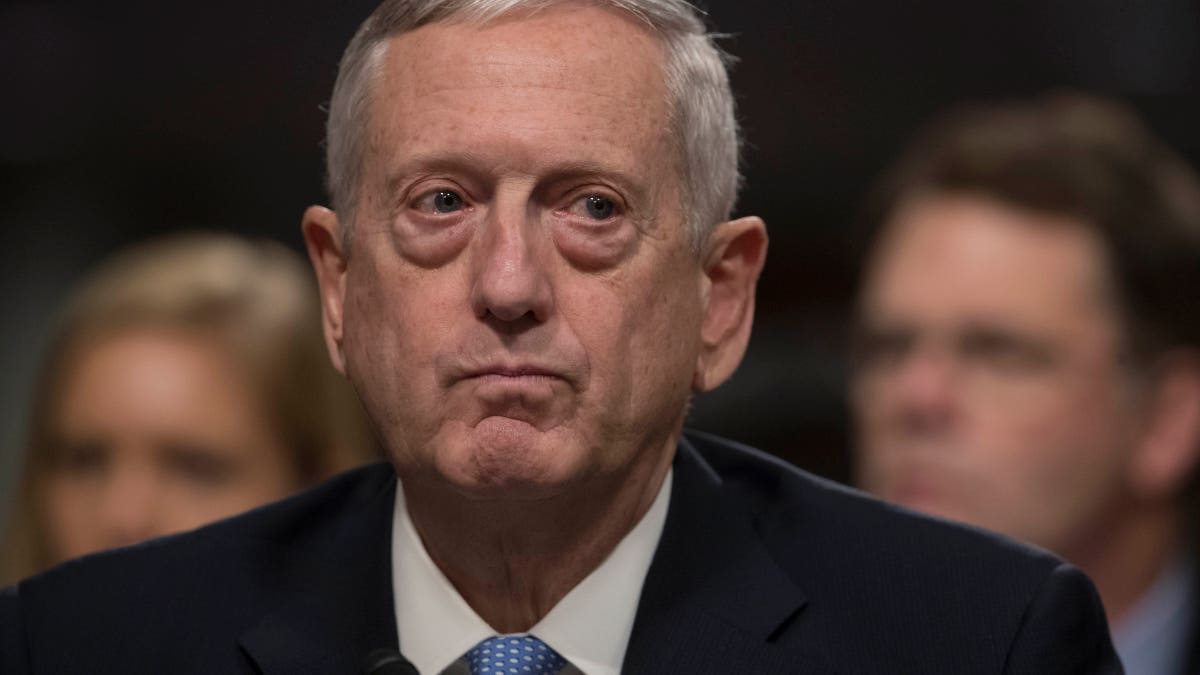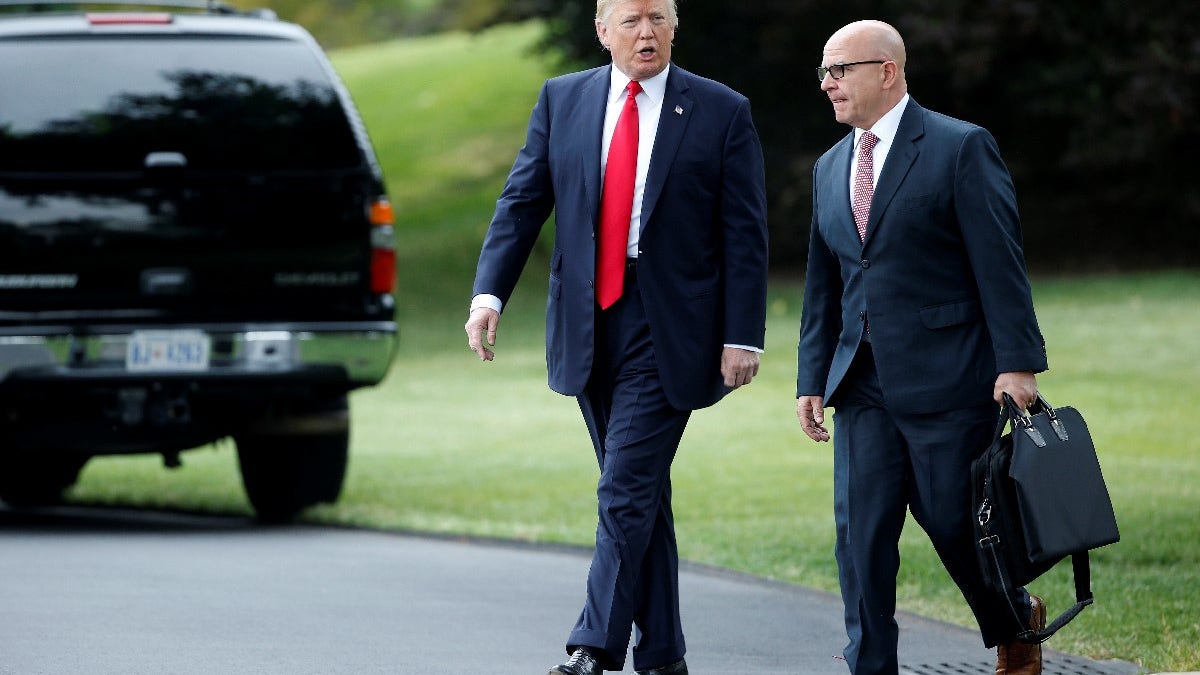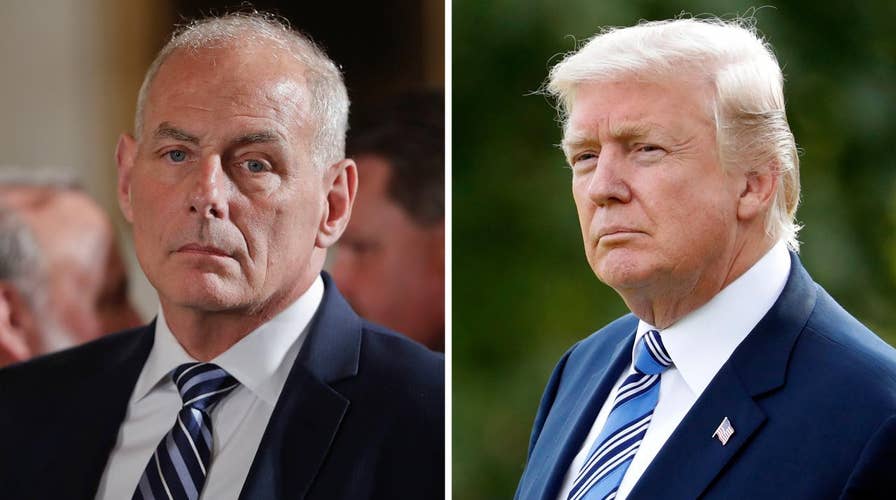EXCLUSIVE – When retired U.S. Marine Corps Gen. John Kelly was sworn in as White House chief of staff last week, he took command of a Trump administration that now has more military commanders in top spots than any since Eisenhower's.
The generals hand-picked by Trump -- Kelly, National Security Adviser H.R. McMaster and Defense Secretary James Mattis -- share a penchant for passing their opinions up the chain of command in the bluntest of terms. Their prominence in the administration belies the common perception the commander in chief prefers to be surounded by yes men.
“Jim Mattis defines ‘speaking truth to power’ in my view, and I like to think I do as well,” said Kelly, speaking exclusively with Fox News in his first interview since becoming chief of staff. “I observed him do it routinely -- every day -- as we planned the invasion of Iraq and its aftermath.”
" ... telling the unvarnished truth to power doesn't mean you always get your way.”
A fourth general, Joint Chiefs Chairman Joseph Dunford, is a holdover from the prior administration yet shares many of the same qualities that have endeared other high-ranking military men to Trump.
Kelly had already earned Trump's approval by serving as Homeland Security secretary during the first six months of his administration. His no-nonsense pursuit of Trump's agenda on immigration and terrorism prompted Trump to brand him a "star," and tap him to succeed Reince Priebus as chief of staff. The job, which has traditionally been the domain of civilian leadership, makes Kelly the president's top adviser.

FILE - In this Jan. 12, 2017 file photo, Defense Secretary-designate James Mattis listens on Capitol Hill in Washington while testifying at his confirmation hearing before the Senate Armed Services Committee. Some of President-elect Donald Trumps most important Cabinet choices are at odds with him on matters that were dear to his heart as a campaigner and central to his promises to supporters. For the Pentagon, the CIA, the State Department and more, Trump has picked people who publicly disagree with him on some cornerstones of his agenda In confirmation hearings. (AP Photo/J. Scott Applewhite, File) (AP)
Mattis, who famously said he devises a contingency plan to kill everyone he meets, required an act of Congress to get the job, since he hadn’t been out of the military long enough when he was appointed to his role. Once he got the waiver, he breezed through confirmation by an 81-17 vote.
"He’s a humble man with very little to be humble about," William Cohen, who served as President Clinton's Pentagon secretary, said of Mattis.
The careers of all four men have intersected over the years. Kelly, Mattis and Dunford came up through the Marines and all are in their 60s. McMaster is younger, at 55, and came up through the Army. Yet all have made their reputations on both the battlefield and, in recent decades, the Pentagon boardroom.
Kelly was a captain in the 4th Marine Expeditionary Unit when he first met then-Lt. Col. Mattis in the Persian Gulf War, “but really got to know him right after 9/11 when I became his assistant division commander in the 1st Marine Division, Camp Pendleton, California.”
That was the summer of 2002. The two Marines then deployed to Kuwait later that year, and lived together in the desert until the U.S.-led invasion of Iraq started in March 2003. After leading a column into Baghdad, Kelly and Mattis led Marines in the intense combat over Al-Anbar province which went into full-scale revolt in 2004.
Meanwhile, then-Army Capt. McMaster earned a Silver Star from the Battle of 73 Easting in Operation Desert Storm, when his heavily outnumbered armored unit destroyed 28 Iraqi Republican Guard tanks without loss in 23 minutes.
McMaster, once described as a “blunt-spoken bulldog of a man,” was passed over for promotion to brigadier general twice for “making too many enemies to rise past the rank of colonel” before getting his first star. He replaced another general favored by Trump, Mike Flynn, as national security adviser and has continued to ruffle feathers – on the right and left.

“Regarding H.R., I heard of him first when I read his superb book ‘Dereliction of Duty,’” said Kelly, referring to McMaster’s seminal work in which he argued that the Vietnam War was lost because military leaders should have more openly voiced their opposition to the Johnson administration’s policy of gradualism.
“Never really got to know him very well until he joined the administration,” Kelly said. "[But] every day I see him speak truth to power to me in my current position.”
As the generals have taken command of the West Wing, including reportedly limiting who the President can see and what he can read, all three have come under intense scrutiny by both right and left.
Michele Flournoy, said to be in the running for Secretary of Defense had Hillary Clinton won the election, worried that “putting too many former senior general officers into civilian positions can be cause for concern in a democracy where we pride ourselves on civilian control.”
A top-level Washington government executive said recently about the widely-respected members of President Trump’s administration, “why would they risk their careers to be around such a man?”
That criticism was echoed by Cohen in an interview with Politico.
“The larger point is, whether it’s Kelly, Mattis or McMaster, you can spend a lifetime building credibility, and lose it overnight,” Cohen said.
McMaster, meanwhile, has come under fire from right-wing allies of White House Chief Strategist Steve Bannon -- himself a former Navy lieutenant -- for working for a think-tank that was funded by George Soros, the billionaire financier of leftist causes.
With a president caught between a Bannon wing focused on domestic priorities and a military wing focused on winning wars, Kelly said he’s aware that the responsibility of the three generals is to advise, not command, inside the White House.
“Remember, telling the unvarnished truth to power doesn't mean you always get your way,” Kelly told Fox News. "The principal ultimately decides and it is our way that so long as that decision is legal, moral, and ethical, one salutes and executes. Sometimes you win and sometimes you don't.”

A close examination of the three generals closest to Trump shows each brings a slightly different toolkit to addressing the same problems they see in generally the same frame: years of neglect of the military and America’s national security obligations, as well as an awareness that as American culture proceeds down a path of progressivism military culture, in their views, must remain deeply conservative to stay effective in a world of rapidly evolving threats, not to mention the longest run conflicts in American history.
Both Mattis and Kelly worried that social changes during the Obama administration, such as allowing transgender people to serve and bringing women into combat roles, were hurting so-called battlefield lethality, or the ability of America’s military to win wars with the fewest number of casualties, on both sides.
“That’s the only filter we should ever look through,” Kelly told Fox News in a prior interview late last year. “Whether it's buying a new jet fighter, a new tool -- or any of the social changes. The only thing we should do is ask, ‘does it make us more lethal on the battlefield?’”
Kelly said “many of the changes” undertaken by the Obama administration, “particularly the social changes, are not very wise.”
Mattis, who rarely does interviews, was reportedly pushed out during the Obama administration because his abrasive nature rubbed some Pentagon insiders the wrong way.
In a book co-authored with former Bush national security official Kori Schake, ‘Warriors & Citizens,’ Mattis wrote that as for “the inclusion of women in the infantry, and allowing homosexuals and transgender people to serve openly in America’s military forces… the public may perceive them as civil rights issues; the military by and large does not.”
That’s because, as Schake explained in an interview with Fox News, that while America’s civilian society values diversity and inclusion, “lightning strikes of great ideas are not the metric of success of a military unit. Unit cohesion and battlefield lethality are the measures of success of military units. And that is a perspective many civilians lose sight of.”
McMaster has been criticized for working for a think-tank that supported President Obama’s nuclear deal with Iran. But McMaster’s comments when he was active duty with a top strategic planning unit in the Army show he’s anything but an apologist for America’s enemies – including Iran.
“What is required is forward deterrence,” McMaster said last year. “Convincing your enemy that your enemy is unable to accomplish his objectives at a reasonable cost -- rather than sort of an offshore balancing approach… which we know obviously from recent experience confirms is inadequate.”
In fact, McMaster, Kelly and Mattis all seem united in their criticism of civilian encroachment on military affairs.
In a celebrated Veteran’s Day address to Georgetown University in 2014, McMaster told students that the “warrior ethos” is at “risk” for a variety of reasons, including but not limited to a “coarsening” popular culture, fewer Americans are “connected” to the military, and “fewer and fewer Americans understand what is at stake in the wars in which we are engaged.”
“It’s all the more important today that we hold to our precious legacy of ferocious, ethical combat performance,” said Mattis in a 2014 speech. “For in a world awash in change, Americans need to have confidence in the everlasting character of our Marines.”
Trump has said he wished he served in the military himself, and is very proud of going to the New York Military Academy, 20 minutes from West Point, for high school.
As Trump’s son Donald Jr. told Fox News last year, “my father raves about military school. He often says it's the best thing that ever happened to him. It gave him a lotta discipline.”
Such sentiments could explain why Trump has turned to the military to bring discipline to a White House awash in leaks and palace intrigue, and to bring a reasoned focus to a world rife with threats, sensing weakness and decline in the world’s only superpower.
Trump's generals are ready for battle.












































